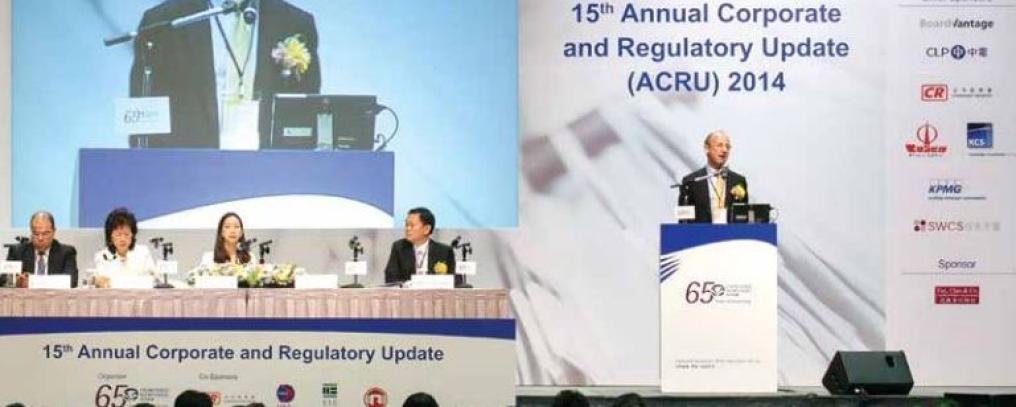The Corporate Secretaries International Association (CSIA) teamed up with the Global Corporate Governance Forum (GCGF) to publish the 'Corporate Secretaries Toolkit’ earlier this year. This second part of our interview with Carina Wessels, CSIA President, and Philip Armstrong, Head of the GCGF, discusses another recent CSIA project relevant to the profession globally – the publication of the 'CSIA Governance Principles for Corporate Secretaries’.
The 'CSIA Governance Principles for Corporate Secretaries’ were launched late last year – how do they differ from the OECD corporate governance principles which have become a global benchmark for governance?’
Carina Wessels: 'The idea of the CSIA principles was to make them very practical for corporate secretaries. They address the day-to-day practical perspective of what the corporate secretary needs to do to ensure general governance principles in an organisation. The OECD principles are under review at present so, for the corporate secretary principles, we took some of the more recent thinking on sustainability and integrated reporting into consideration as well. Although it is not necessarily a trend everywhere in the world, an integrated approach was at least suggested as a best practice.’
You mention the practical focus of the CSIA principles – would you say that the real value of the exercise is the advice on practical implementation which accompanies each principle? For example, the transparency principle is followed by a reminder that real transparency is about disclosing bad as well as good news?
Philip Armstrong: 'Yes. People always want the credit when things have gone well but they don’t want the blame when things go badly. This is the difficulty with companies and transparency, I think the issue of transparency is a very difficult one, because transparency is dependent on a lot of factors. It depends on a professional and informed media free to report and scrutinise companies, and on active investors and a strong enforcement regime and some markets may have one or two, but not all three, of these necessary components.’
Carina Wessels: 'I think it may be an aspiration more than perhaps a reality, but that is probably the case with a lot of governance issues – they start off as aspirations.’
One of the CSIA principles aims to distinguish the role of directors from the role of executives, but in a family-owned company those distinctions don’t always exist.
Philip Armstrong: 'When the IFC makes an investment in a company in emerging markets we do try to encourage some measure of independence on the board, but at the same time we also recognise that a family-owned business is, after all, a family business. What we focus on mostly is to try to ascertain thatthe board is reasonably professional even where it is made up of a number of family members or close relatives. But we have to be pragmatic and in some markets, frankly speaking, the more effective businesses are family businesses, notwithstanding that they don’t entirely comply with, or adhere to, what we may call classic good governance. A recent study found that investors showed a bias towards family- owned and closely held businesses because they felt there was a longer-term perspective. Where the trouble usually tends to start in family-held businesses is when you move to the second and third generation, and people are being appointed to the board more out of patronage and family affiliation. That's when the successful family companies bring in more professional board members.’
Are the CSIA principles relevant to the corporate governance challenges of both developed and emerging markets?
Philip Armstrong: 'In developed markets we worry about executive compensation and board independence – we tend to worry about very structural in a market where legal enforcement is rigorously asserted, the media is free to report and investors have some challenges but are by and large active, why do we keep having these recurring crises?
Meanwhile, the problem you are having in Europe, and it is affecting the UK, is that there is an increasing tendency to regulate corporate governance. Unfortunately I think that will be detrimental to corporate governance; it pushes it towards the rules-based regime that operates in the US and, as we have seen, that is not very successful, but then of course the principles-based system in the UK was shown to be deficient issues, but in emerging markets the challenges are conflicts of interest, related- party transactions and how independent directors operate on a board that is dominated by a controlling shareholder. Those are much more nuanced and difficult issues to deal with than the structural obsessions that we have in the advanced markets.
The other problem we have is that the global financial crisis occurred due to governance issues in the markets that actually defined governance standards. So that brought something of a credibility gap to corporate governance in a lot of markets. I fear that we're likely to have a few more crises before too long.’
On the same scale as the 2008 crisis?
Philip Armstrong: 'Yes. When you look at the US you actually wonder if anyone learned anything from the crisis. There has been massive pushback on all the legislation that was brought into place, particularly from the banking lobbyists and various other interest groups in the business sector. I wouldn’t say that that leaves you with a lot of confidence. It is just back to business as usual. But we have to be concerned that we've had three crises now that have come from the world's largest economy – the dot com bubble, Enron, Worldcom and so on, and then the global financial crisis. You have to ask yourself, in the financial crisis. This is a difficult issue for regulators and policy makers.’
Carina Wessels: 'You end up with a lot of box ticking and the specific issues that need to be addressed are not really part of the DNA or the culture of the organisation. They are not focusing on being well governed but on seeming to be compliant from a regulatory perspective.’
Philip Armstrong: 'In the US it's all about box ticking because litigation is so pervasive. The idea that you follow a set of principles where you can exercise a measure of judgement is seen as almost suicidal because if you make the slightest mistake somebody is going to sue you.’
Do you recommend, then, that jurisdictions adopt principles- based corporate governance regulations?
Philip Armstrong: 'What we've lost in the governance discussion is that governance was originally designed to articulate the practices behind the legal requirements. You can add a requirement in a code or regulation that directors need to be inducted, but then the question is how that is done – what would we, in this market, consider to be good practice?
So governance was designed to offer some practical guidance in the relevant market as to how the various legal obligations should be discharged. But, as a result of all these crises that we have had over the last 10-20 years, governance has become very politicised and we certainly saw that in the global financial crisis. So the tendency has been to seek a quick fix and that quick fix tends to be regulation.
So we are moving towards a more rules-based response. The problem is that pharmaceutical companies will be structured differently to financial or retail companies. The principles-based approach offers you the opportunity to provide a principle around a common issue or practice and then companies can modify their practices relevant to their particular sector and business structure and leave it to the market to evaluate and interrogate. I think we are losing some of that.’
Is the weakness of the principles-based approach the fact that there is not really much of a price to pay for companies who just do the minimum?
Philip Armstrong: 'The principles-based approach was designed in a market where all the essential elements to make it work existed. The media, investors and an effective regulatory enforcement regime are all present in the UK market. The problem is that there has been an imitation of the approach in markets without that necessary infrastructure.
The problem with the principles-based approach always reminds me of Winston Churchill's comment about democracy being not a great idea but the best one we've got right now. I think principles-based corporate governance falls somewhere in that category.
The other shortcoming in my view is that there are a lot of systemic issues that aren’t being addressed. We talk about institutional investors as if they are all active, engaged and participating in the market, but they aren’t. I can probably give you a handful of investors and institutes that are genuinely interested in the market and genuinely consider how they vote their shares.’
Carina Wessels: 'What we have seen recently in the South African context, and I think it has been fairly successful, is that we have implemented a code for responsible investing. This places obligations on investors, as well as companies, to think about what they need to do to improve the whole governance framework. We've seen a lot more interaction, not at the level that it should be, but we have seen a lot more interaction between nominee shareholders and institutional investors with companies in terms of the way they intend to vote and why they intend to vote that way. There has also been an increased understanding from companies about what investors’ needs are.’
Thank you both very much for giving CSj this interview. My last question is just to ask about your future plans – are there any other joint CSIA/ GCGF projects in the pipeline?
Philip Armstrong: 'At this stage we haven’t sat down and looked at a plan for the way ahead. I think for us the discussion would be around market segmentation. Obviously, we won’t be using the Corporate Secretaries Toolkit in those countries where national organisations exist and are active, but what for us is important is that we have a partnership with the people that are professionals in the field. If we are faced with training requirements, or changes to laws and regulations which affect the role of the corporate secretary, we have a body to whom we can turn, either for trainers to help us support the training that will take place in these countries, or to comment on the laws and legislation that we often are presented with in these markets. So that's how we would see the working relationship.’
Carina Wessels: 'We see the role of our local member bodies and the CSIA as being a voice for governance globally and the GCGF is very well established in this field. So, although there are no specific initiatives being planned, in terms of a general collaboration, we would like to have a lot of interaction and a lot of collaboration with the GCGF.’
Carina Wessels and Philip Armstrong were interviewed by Kieran Colvert, Editor, CSj. The 'Corporate Secretaries' Toolkit was launched
in Hong Kong on 16 April 2014 at the Foreign Correspondents' Club. The first part of this interview was published in the June edition of CSj.
Since the interview, Philip Armstrong has become Senior Advisor: Corporate Governance at the International Finance Corporation (IFC), part of the World Bank Group, based in Washington DC. The Global Corporate Governance Forum has now been absorbed into IFC's Corporate Governance Group.



